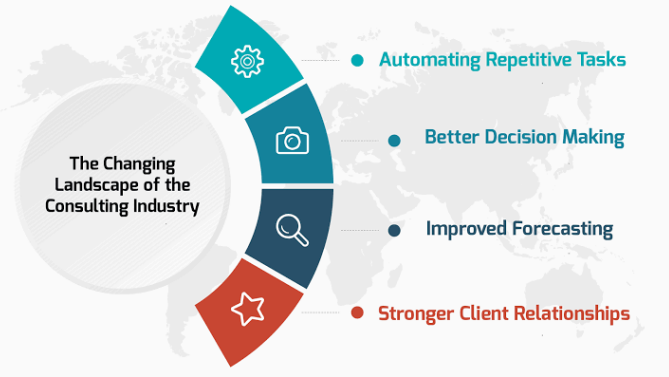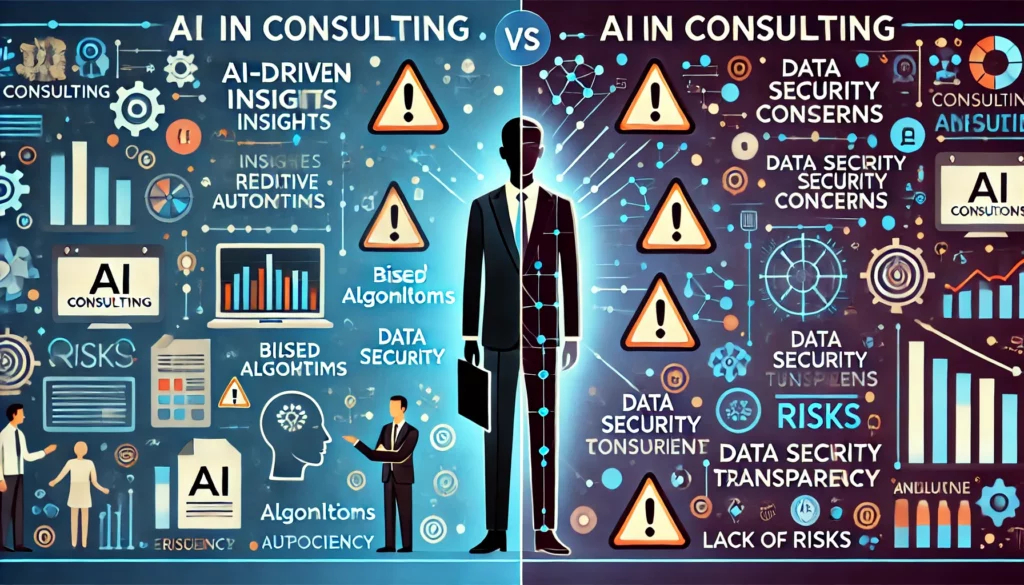
The Rise of AI in Business Consulting
Once a concept confined to sci-fi movies, artificial intelligence (AI) is now influencing all aspects of our lives, including business strategy. It revolutionises how consultants analyze data, optimise processes, and make decisions. AI is no longer a buzzword tossed around in tech conferences, instead it is reshaping business consulting in dynamic ways. The world of business consulting is on the cusp of transformation, driven by rapid advancements in technology. This transition can be a consultant’s ‘dream’, but if not understood and utilised efficiently, it could be
their worst ‘nightmare’.
So what exactly is AI in Business Consulting?
To define it, AI in business consulting refers to the use of advanced algorithms, machine learning models, and data analytics to provide smarter, more efficient solutions for businesses. AI can process vast amounts of data far more quickly and accurately than any human, enabling consultants to offer insights and strategies that are both data-driven and forward-thinking. AI tools can assist consultants in everything from identifying market trends to providing tailored recommendations. It’s not about replacing human consultants; it’s about enhancing their capabilities, making their decision-making more precise and their work more impactful.

Industry Overview
The global AI consulting services market size was valued at USD 12.08 billion in 2023. The global market is predicted to grow from USD 16.4 billion in 2024 to USD 189.7 billion by 2032, growing at a CAGR of 35.8% from 2024 to 2032.

Benefits and Impact
Leveraging the power of AI in consulting offers several advantages like enhanced sustainability, predictive analysis, tailored solutions, and greater efficiency. Several renowned consulting firms are leveraging the power of AI in their own unique ways.
McKinsey & Company has integrated AI into its McKinsey Analytics division, which combines data science, AI, and advanced analytics to help clients improve their business processes. The firm has also developed QuantumBlack, an AI and advanced analytics subsidiary that works closely with clients to solve complex problems using cutting-edge machine learning techniques.
Boston Consulting Group (BCG) launched its own AI and digital transformation arm called BCG Gamma. This division focuses on using AI to solve client problems across various industries, including finance, healthcare, and manufacturing. Deloitte has launched a suite of AI-powered solutions under its Deloitte AI Institute. The firm uses AI in areas like risk management, fraud detection, and financial analysis. KPMG has focused on integrating AI across its audit, tax, and advisory services. It has also partnered with tech giants like Microsoft to build AI solutions for sectors such as banking, insurance, and healthcare.

Precautions
It is however important to take certain precautions to unlock the full potential of this tool. Some necessary measures are :
1. Bias in Algorithms: AI systems are only as good as the data they are trained on. If the data used to develop AI models is biased, the insights provided could be skewed.
2. Transparency and Explainability: AI models can be complex and opaque, often acting like a “black box.” For clients to trust AI recommendations, consultants need to ensure that AI-driven insights are explainable and transparent.
3. Human Expertise Still Matters: AI may be able to crunch numbers, but human intuition, creativity, and emotional intelligence are irreplaceable. Consultants should always complement AI insights with their expertise and judgment.
4. Data Privacy and Security: As AI relies heavily on data, ensuring robust security protocols is critical. Sensitive business data should be protected from breaches, and consultants must comply with data protection laws, such as GDPR or CCPA when using AI tools.

Conclusion
In conclusion, leveraging AI’s power can significantly boost consultants’ proficiency provided we understand its intricacies. Business consultants have a knack for details and small changes today lead to massive developments tomorrow. The impact of artificial intelligence is undeniable- though often subtle. The integration of AI into consulting practices is not just a trend, but an evolution that promises to increase value, make improved decisions and drive results for clients. While invisible in its day-to-day operations, it is a development that will continue to be a key driver of innovation and transformation across industries. However, as with any powerful tool, careful consideration must be given to ethical implications and the need for human insight. For consultants willing to embrace this technology responsibly, the future holds vast potential to reshape how businesses strategize, innovate, and grow in an increasingly data-driven world.
About the Author

Ihinaa Hans
Ihinaa Hans is a Consultant at the Ramjas Consulting Society. Currently pursuing a B.Com (Hons.), she is a finance and consulting enthusiast, driven by a passion for strategic problem-solving and industry insights.



